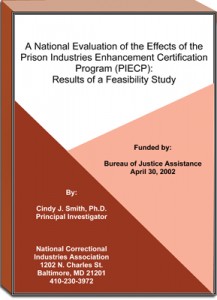Labor Partnership: PIE Programs
Though the Prison Industry Enhancement Certification Program (PIECP) has been available to correctional industries in one form or another since 1979, few could navigate its many rules and regulations. Administered by the US Office of Justice Programs, Bureau of Justice Assistance (BJA), PIECP certification excepts participating agencies from certain Federal restraints placed on the marketability of prison-made goods by permitting the transport of such goods in interstate commerce and the sale of such goods to the Federal government.
Under BJA’s guidance, correctional agencies can engage in the interstate shipment of prison-made goods for sale on the open market if, and only if:- Inmates are paid at a rate not less than the rate paid for work of a similar nature in the locality where the work takes place
- The hiring of inmates does not result in the displacement of employed workers outside the prison or jail, does not occur in occupations in which there is a surplus of labor in the locality, and does not impair existing contracts for services
- Deductions from inmate PIECP wages are limited to four purposes only (room and board, taxes, victims’ compensation/restitution, and family support) and do not exceed 80% of gross PIECP wages
- Inmate workers are provided with the same benefits normally provided by the state or Federal government to similarly situated workers, e.g., Workers’ Compensation (or its equivalent) and FICA
- Local labor organizations and competitor manufacturers are notified of the partnership prior to the initiation of operations
- Inmate involvement is voluntary
PIECP is designed to benefit participating departments of correction by providing both a cost-effective prison work program that would offset some of the costs of incarceration, and a prison management tool that reduces institutional violence. Taxpayers benefit as inmates became tax producers, able to provide financial support to victims of crime and their own families. Victims and the families of participating prisoners benefit through direct financial contributions from inmate workers. Private sector companies gain a stable and readily available workforce, and possibly industrial space and training assistance. Inmates themselves benefit by increasing their job skills and experience and thus their prospects for successful transition to a job upon release.

